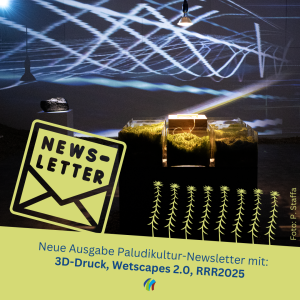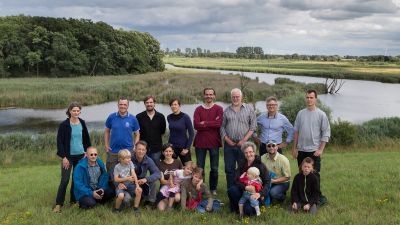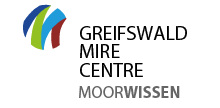News
December 2024
Paludiculture & 3D, Map 2.0 and more
by Dorothee Scheuch (comments: 0)
Newsletter – new issue

11/12/24 Will there will be cattails in printer cartridges in the future, what are thematic maps the new Global Peatland Hotspot Atlas and what will the WETSCAPES 2.0 project be examining over the next ten years – find out in the just published current issue of our Paludiculture newsletter.
Further topics include the compendium on the paludiculture potential of Ukraine and details & deadlines for the international paludiculture conference "Renewable Resources from Wet and Rewetted Peatlands" from September 23rd to 26th, 2025 in Greifswald, jointly organized by the Greifswald Moor Centrum and the Thünen Institute. Also in this newsletter: reports about EIN:FLUSS:RAUM:MOOR, the joint exhibition by MONAS-Collective and Greifswald Moor Centrum inspired by Caspar David Friedrich, about a soil workshop within the PaludiNetz and about the conference "MENSCHEN.MACHEN.MOORE."
We hope you enjoy reading and are happy to receive feedback on the newsletter by email to communication@greifswaldmoor.de.
New: Wetscapes 2.0
by Dorothee Scheuch (comments: 0)
10 mio project funded by Deutsche Forschungs Gesellschaft

04/12/24 ‘WETSCAPES2.0: novel ecosystems in rewetted fen landscapes’ will investigate the functioning and complex ecological, biogeochemical and hydrological processes in rewetted fens. The funding from the German Research Foundation was acquired by the Universities of Greifswald and Rostock together with the Leibniz Institute of Freshwater Ecology and Inland Fisheries (IGB Berlin), the Helmholtz Centre Potsdam German Research Centre for Geosciences (GFZ), the Ludwig-Maximilians-Universität München (LMU), the Max Planck Institute for Biogeochemistry Jena (MPI-BGC) and the Humboldt-Universität zu Berlin (HU).
The background: peatlands have been drained for centuries, which has led to significant greenhouse gas emissions, nutrient discharge into watercourses and neighbouring ecosystems as well as massive losses of biodiversity. Rewetting programmes across Europe are now intended to reverse these negative effects. However, this is not restoring the original peatlands, but creating new types of ecosystems, the functioning of which is still only partially understood.
The research network aims to better understand the functioning and complex ecological, biogeochemical and hydrological processes in rewetted fens. It will investigate the effects of rewetting peatlands in space and time at landscape level and beyond. In the long term, concrete contributions to the management of these areas and to sustainable utilisation through paludiculture will be developed.
WETSCAPES 2.0 strengthens cutting-edge research in Mecklenburg-Western Pomerania and also makes a decisive contribution to addressing global challenges such as climate change and biodiversity loss and advancing nature-based solutions locally. Knowledge transfer and the communication of research topics for greater social acceptance will take place in close cooperation with the Greifswald Mire Centre.
The DFG's Collaborative Research Centres (SFB) are long-term research institutions at universities in which scientists work together as part of an interdisciplinary research programme. Innovative, challenging, complex and long-term projects can be realised in the Collaborative Research Centres by coordinating and concentrating people and resources at the applicant universities. They serve to develop institutional priorities and structures.
More information can be found in the media information of the University of Greifswald.











